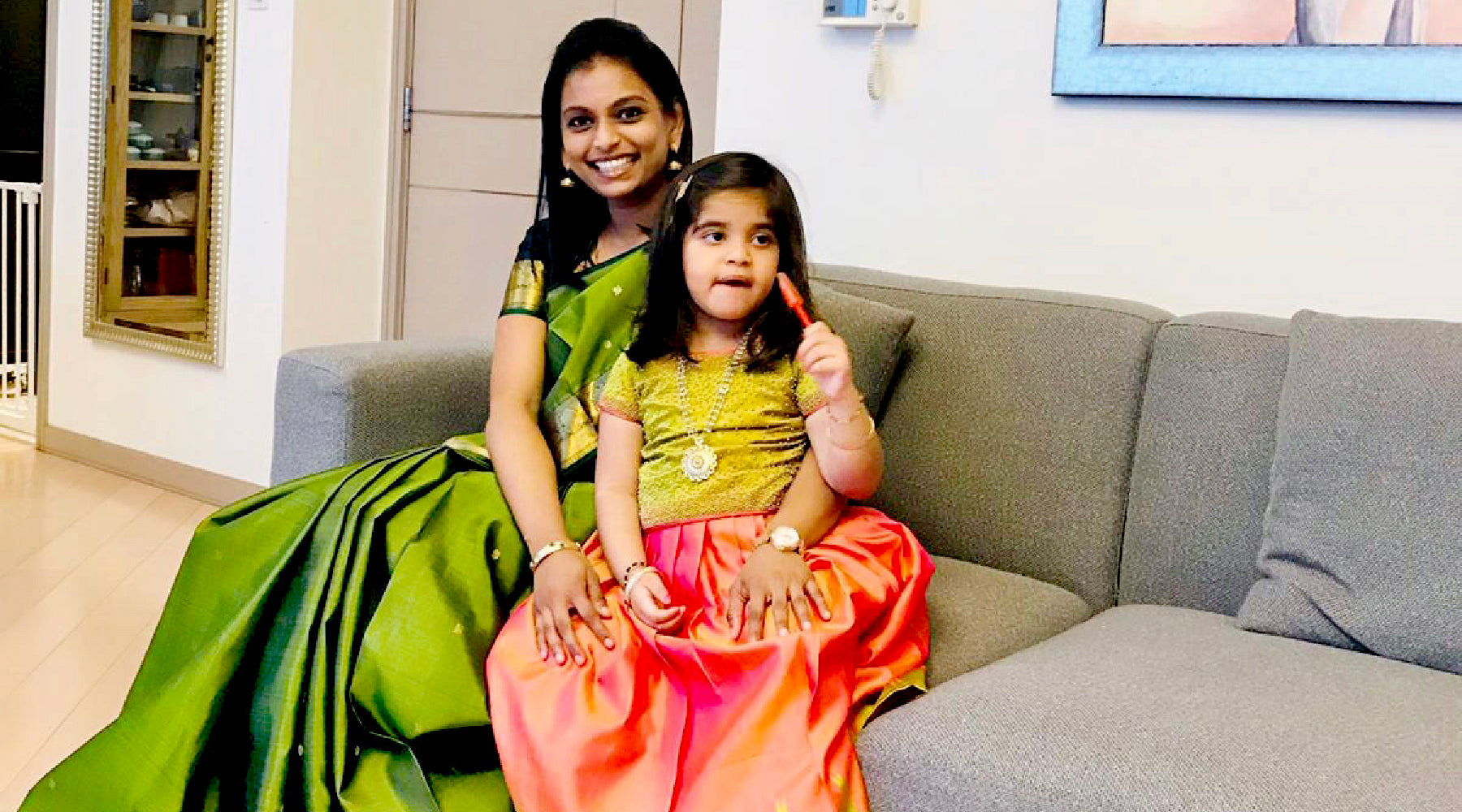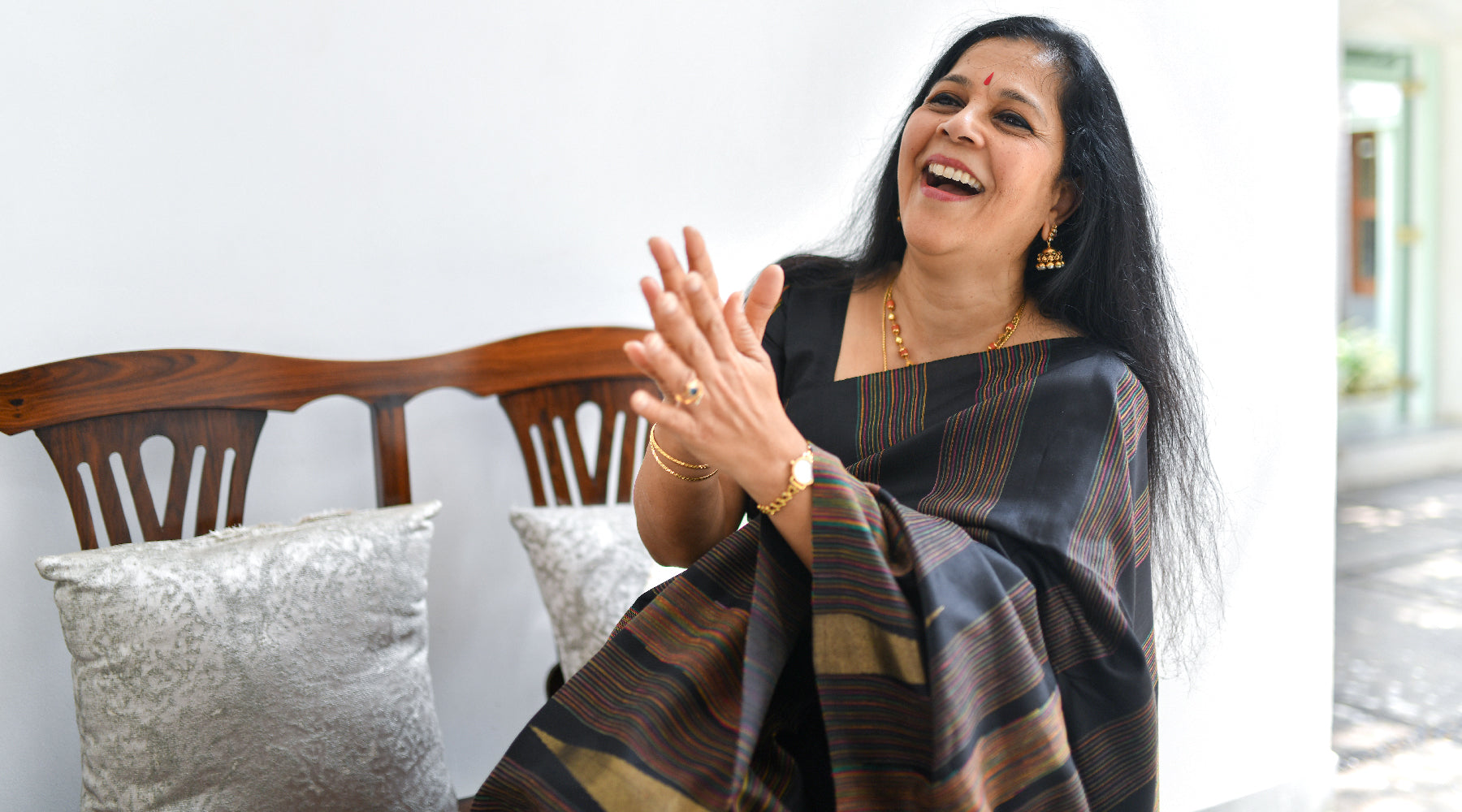KANAKAVALLI VIGNETTES : Effie Thomas - Past, Present

In January's Vignette, Effie Thomas gives us a glimpse into her fascinating life in Dubai as a small business owner, a mother, and a collector of vintage cars and art. Growing up, Effie's parents instilled in her a love for craft and for all things Indian; a love she continues to nurture and hopes to pass on to her own daughters. The sari is her everyday garment and, through the sisterhood of the Gulf Saree Pact, Effie endeavours to support ethical crafts and weavers in India, making wearing a sari a way of life. With an enviable collection of vintage sports cars as well as exquisite heirloom textiles and pieces of art, Effie and her husband recognise the value of preserving the past. Their passion goes beyond the joys of collecting, and they go to great lengths to unravel the stories behind every object, appreciating the skill of the craftspeople and keeping heritage and tradition alive. In this conversation with Aneesha Bangera of the Kanakavalli Journal, Effie opens up about her commitment to staying rooted in her Indian past and about the spark that keeps her going. Browsing through the Kanakavalli repertoire, Effie curates a selection of beautiful kanjivarams, each a reflection of her love for the craft.
Excerpts of the conversation below.
Past, Present
How did you first grow interested in the arts? Tell us a little bit about your childhood and growing up with your Gandhian father.
I grew interested in the arts at a very early age. Traditional garments like the sari, half sari, pavadai and salwar kameez were always my choice of clothes from when I was 10 years old. As a child, I remember being my confident best when I was dressed in Indian clothes, irrespective of the occasion. This came naturally to me, as opposed to many of my friends who made choices influenced by the latest trends.
My parents never splurged on clothes, for several reasons. They preferred that we took good care of what we had. When they did shop, which was about three times a year, they would buy us fabrics and clothes of high quality, mostly in cotton and other handspun and handwoven fabrics. I always remember my father as a well-dressed man, wearing white or light-coloured khadi shirts, while my mother was always draped in cotton jamdanis that came from Bengal and Dhaka. She taught us how to take care of our saris so well that me and my sisters follow that process even today. The simple act of hand washing cotton saris, starching them, drying them in the sun, ironing and folding them, still holds meaning for me; I find it so liberating. I remember my father always talking about the freedom struggle, the Swadeshi movements and the importance of khadi and craft. He would take us on historical tours very often and, thus, I was exposed to the soul of India and her crafts very early on. I recognised the impact of art and craft on our minds, how they seem to hold together an entire heritage.
What is the role that arts and crafts play in your life now? How have you made this a part of your family life and travels?
After the first few years of moving out of India and away from my family, I lost touch with all that I had grown up with. And looking back now, I see how this took its toll on me. I chased fancy, expensive things, but none of them felt wholesome or did me any good. Years later, once I found a life partner, became a mother to two daughters and started building my own home, I sought out the things I'd learnt as a child. I went back to discovering the art, craft, culture and tradition that truly brought me happiness. My husband did not have the same exposure I did, but he saw my passion and began to absorb this love for the arts too. We both are essentially old souls, and this is now one of the many things we share with an equal passion. Today, I try to emulate my father, and my family does a culture trip to India once every year. The four of us decide on very specific locations and we try to understand a particular aspect of art or architecture in great depth. Our travels thus far have included visiting beautiful heritage properties in Shimla, Hyderabad, Ladakh, Agra and Calcutta. These are some of our favourite memories as a family.
How did you and your husband become art collectors? What are some of your favorite pieces that you own?
While my husband works in oil and gas as a fuel oil trader, I run a consulting firm called Business First Consulting and we are both based out of Dubai. Our work demands that we are engaged in areas not even remotely connected to the cultural and crafts side of things; a side that holds meaning for both of us. Thus, we fuel our passion by investing in vintage objects and designing our home with an aesthetic that reflects our love for the arts.
As we began to invest in vintage sculptures and textiles, we realised not only that these objects would only appreciate in value, but that it was also a way for us to keep in touch with the handmade elements of our country's heritage. We began to meet other collectors and learn about preserving these pieces. In fact, we are trying to build a private museum back home in India, to showcase some of the beautiful old things we have collected.
Among the pieces we own are a traditional Patan Patola , a stunning kalamkari panel by M Kailasam Garu, a gold jamdani Kalpavriksham and a Kamadhenu by Sri Ramanaiah. We also own a 70-year-old Asavali traditional skirt, a 100-year-old Mata ni Pachedi panel, a 70-year-old Rogan panel, a Telia Rumal panel by Sri Govardhana, and a 70-year-old Venkatagiri cotton with zari checks. In our collection, we also have vintage Kanjivarams, Himroo and Paithani panels from Suraiya Aapa, and a whole lot of vintage furniture and pieces of art.
One of my favourites is the Patan Patola woven by the world-famous Salvi Family, that was woven exclusively for me; it will always have a special place in my heart.
Tell us about how you began to collect vintage cars and what this hobby means to you.
We first began to collect vintage furniture and pieces of art, and as we recognised the appreciating value of these objects we then turned to cars about four years ago. My husband has always been a car person and it seemed like a natural extension of our interest in collecting. Living in Dubai we were also exposed to some of the finest cars in the world. People here are spoilt for choice and both expats and locals find this one of the best locations in the world to get the cars of their dreams. We see some of the most luxurious versions of automobiles - some of them customised for the Arab royalty - on the road here. There are also a large number of collectors who are interested in vintage automobiles, and meeting some of them encouraged us to get involved ourselves. While we started out as passionate motorheads, we gradually started to look at it as an investment as well. When buying a vintage car, we look for specific things, such as the rarity of the car (if only a few models were made per year this makes them more valuable), features that distinguish it from others (the Porsche 356 we own was the company's first production car), and provenance (our Alfa Romeo was initially owned by a US serviceman who shipped it to the US from Italy and locked her up in a barn for 30 years!).
 Participating in a vintage car rally in Dubai
Participating in a vintage car rally in Dubai
Our cars are all examples of the sports automobiles of their era. The 1965 Porsche 356C and the 1970 Alfa Romeo GTV are both fantastic examples of affordable European race cars, while the 1967 Fastback Mustang and the 1980 Corvette were the epitome of American muscle. We are also currently restoring a 1979 Morris Mini because Mr Bean had one! We enjoy finding meaning in every aspect of a car, and these stories add value for us.
Being a vintage car collector in Dubai is very exciting and there are several groups that organise rallies and car shows. From August to April the weather is more pleasant and people love to do things outdoors including attending these shows and going for long drives.
For me, vintage cars are the epitome of the passion designers had back in the day, developing models that were true style icons and symbols of speed, beauty and power.
 Effie and her husband Phinu’s collection of vintage sports cars - (clockwise from top left) the 1965 Porsche 356 C, the 1967 Fastback Mustang, the 1979 Morris Mini, the 1970 Alfa Romeo
Effie and her husband Phinu’s collection of vintage sports cars - (clockwise from top left) the 1965 Porsche 356 C, the 1967 Fastback Mustang, the 1979 Morris Mini, the 1970 Alfa Romeo
For us, collecting cars is not just about a number, but is a way of preserving some of the excitement from our past and about an appreciation for the handmade.
Living abroad, how do you stay connected to the culture and traditions of India?
We make a conscious effort to replicate life in India and we do it together as a family. My family sees me in a sari all the time and they understand how serious I am about being in touch with life in India. From home cooked traditional food, to having a small forest in our backyard, to our aesthetics, we always insist on being appreciative and respectful of what has been handed down to us and what we have inherited.
For us, the Indian way of life is not about one thing or even a few things. It is about every single aspect of our life, from the simplest everyday traditions - the ones we tend to forget about most easily - to the long-term vision we have for our lives. It is sometimes challenging to go against the tide and to be consistent in our way of doing things, but we give it our best shot.
 Effie with her husband Phinu Phillip and daughters Jerusha and Grace
Effie with her husband Phinu Phillip and daughters Jerusha and Grace
Please tell us a little bit about the Gulf Saree Pact - how you started this initiative and some of the activities you have organised.
The Gulf Saree Pact is a group of 80-odd highly motivated, hard-core sari enthusiasts who are great supporters of Indian handicrafts and art. We started this group back in March 2016. Together we motivate each other to make wearing a sari a way of life in spite of living so far away from its natural environment. We go to great lengths to learn about our rich weaving heritage and the lives of the weavers who are the keepers of this heritage. In April 2017, we organised 'Vrithanth', a one-day workshop with Pavithra Muddaya of Vimor fame. We spent an entire day appreciating the heritage weaves of India and its evolution so far. We had 85 attendees for the event. Last July we went to Pollachi and spent a few days at Ethicus to understand in great depth the process of weaving cotton. In the last three years 80 of us have undertaken over five weaver initiatives. This year we are investing in our own sari. We proudly call it 'Arabhya'. We identified an enthusiastic weaving community, invested in the yarn, came up with a design and at the moment we are getting our trial saris woven. All of us at the sisterhood are very, very excited about our project. Apart from that, we help each other find the right textiles, to support ethical sellers and to ensure that ultimately, all our efforts are unified to support craft in its truest sense. We have together built a community of women who encourage and promote crafts, empowering ourselves in the process. We meet every month to ensure that we go beyond the realm of social media, and this is one of our greatest strengths. We are a family!

Topmost image -“Vrithanth”, the 2017 learning workshop with Pavithra Muddaya,organised by the Gulf Saree Pact group. Middle and lower images - the monthly meetings of the Gulf Saree Pact, a celebration of Indian life, culture and tradition
How do you balance your work managing a small business, your role as a mother, and your varied interests?
My firm Business First Consulting provides unique business support services to companies and organisations in various sectors like oil and gas, banking and investment, law firms and others. Working and conducting business in the Middle East has its own set of challenges and this is where we provide solutions. I work from my office at home and that allows me to spend enough time with my family and also pursue my interests.
I do only that which comes out of sheer passion. If I am not motivated I am unable to do even the simplest things. It is this spark and the need to live my life to the best of my abilities that allows me to do multiple things that give me immense joy. Being a mother, being a homemaker comes most naturally to me. My daughters, husband and I have a lot of fun doing things together. Each of us takes an interest in what everyone else is doing, and this just works.
How do you define beauty?
Beauty is forever. Every object, every person, every relationship and gesture that brings me joy and happiness is the definition of beauty for me. It is eternal, flawless, free and forever. I seek beauty in everything. Literally and obsessively. Right now, I have over fifty-five thousand pictures in my phone, all of which are my attempts to capture moments of beauty and inspiration that come into my vision.
 Left to right : Effie in some of her favourite Kanakavalli buys - a black kanjivaram embellished with paisleys; a blue kanjivaram that reminds her of a vintage Rukmini Arundale sari she once saw at an exhibition, and a vibrant yellow and red kanjivaram
Left to right : Effie in some of her favourite Kanakavalli buys - a black kanjivaram embellished with paisleys; a blue kanjivaram that reminds her of a vintage Rukmini Arundale sari she once saw at an exhibition, and a vibrant yellow and red kanjivaram
Tell us a little bit about your relationship with the sari, and with the kanjivaram in particular.
The sari has been my everyday garment for several years now. It has been more than twenty-five years, so I feel a very deep connection with the sari at a philosophical level. The kanjivaram has also become a habit now - I can't seem to have enough of these beautiful silks! The kanjivaram's elegance and simplicity hit the right chords for me. I find it incredibly versatile, and drape it for work and for weddings.

Please tell us about the Kanakavalli kanjivaram you have chosen to wear for Vignettes.
This black kattam kanjivaram was one of my best finds at Kanakavalli. In fact, I think it found me. Its opulence, design, quality and structure is a testimony to the weaver's skill and expertise.
- Effie Thomas, in conversation with Aneesha Bangera
View Effie's curation here



